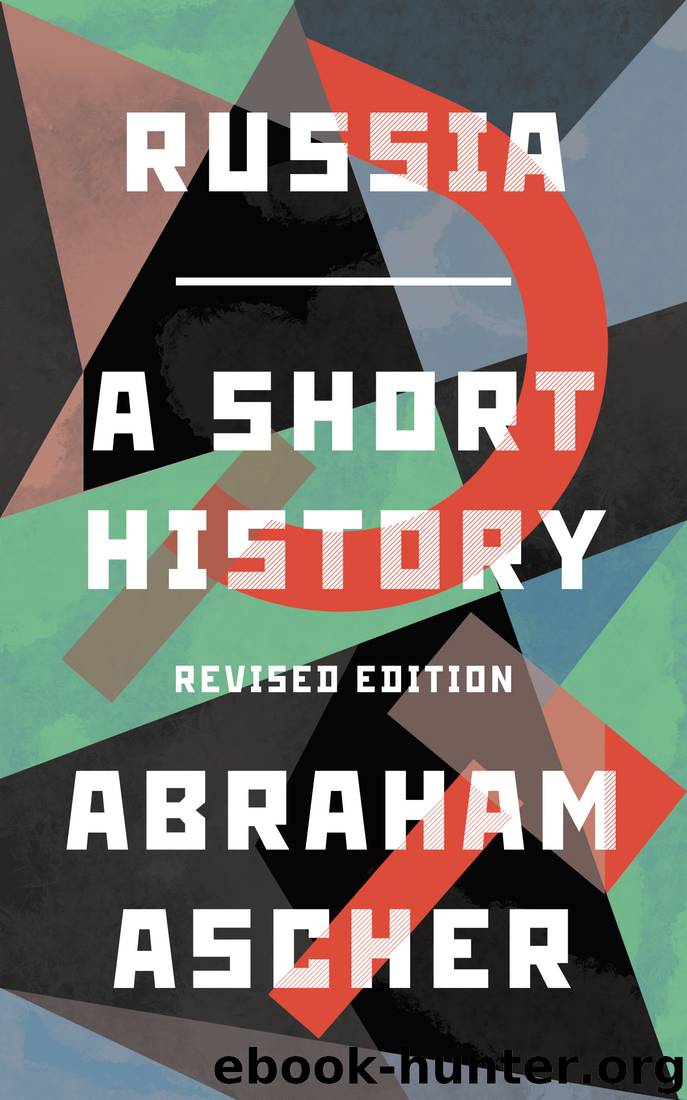Russia: A Short History by Abraham Ascher

Author:Abraham Ascher [Ascher, Abraham]
Language: eng
Format: epub
Tags: History, Political Science, Russia & the Former Soviet Union
ISBN: 9781786071439
Google: S5IZDgAAQBAJ
Amazon: B01N0OY04X
Publisher: Oneworld Publications
Published: 2017-09-07T03:00:00+00:00
8
THE SOVIET UNION UNDER LENIN AND STALIN
Rarely in the history of any country has one man cast so long a shadow as V. I. Lenin has over Russia. The basic contours of the communist system fashioned by Lenin remained intact for about seventy years. Not only was he indispensable in bringing Bolshevism to power, but he created the ideology of Bolshevism, he inspired and guided the organization of the communist movement, and he, more than anyone else, shaped the Soviet system of rule during the first six years of its existence. Anyone who examines the profound changes that Russia underwent after 1917 in its economy, political institutions, and legal order, in the government’s policy towards religion and the national minorities, and in the country’s moral climate invariably encounters the hand of Lenin. This is not to say that every domestic policy of Soviet leaders after Lenin’s death in 1924 followed in detail the lines set down by the architect of the revolution or that Lenin would have acted precisely in the way his successors did. But for over six decades Soviet leaders considered Lenin’s teachings to be sacrosanct and persistently invoked his name to justify their policies. And they spared no effort in disseminating his doctrines. It has been estimated that in 1990 there were no less than 653 million copies of Lenin’s writings in 125 languages in the Soviet Union, which one wag believed was ‘perhaps the only area of abundance achieved by communist efforts’.
Whichever policy Lenin pursued, and sometimes he shifted from one to another rather abruptly, he never lost sight of his final goal, socialism, and no matter how precarious his government’s hold on power, he never contemplated giving up. He was always certain that he was right and that his opponents were not only wrong but perverse in holding on to their position. As one of his contemporaries who knew him well put it, in speaking with Lenin one had the feeling that he had a piece of paper in his pocket with the truth written on it.
His zigzags were especially conspicuous in his attempt to cope with Russia’s crumbling economy. In the cities, there was a real danger of starvation because of a severe shortage of grain, a consequence of both the war and the reluctance of peasants to sell their produce at the prevailing, very low prices. Industrial production had declined by more than two-thirds, leaving many workers unemployed and therefore without the wherewithal to buy the food that was available. Moreover, the transportation system had deteriorated to such an extent that in some regions of the country products could not be shipped to markets. To deal with the mounting crisis, the government in June 1918 introduced a series of radical measures known as ‘War Communism’, the central feature of which was the creation of a state monopoly over all grain. On the government’s initiative, village committees of the poor peasants were formed to requisition the grain from well-off peasants, by force if necessary.
Download
This site does not store any files on its server. We only index and link to content provided by other sites. Please contact the content providers to delete copyright contents if any and email us, we'll remove relevant links or contents immediately.
| Arms Control | Diplomacy |
| Security | Trades & Tariffs |
| Treaties | African |
| Asian | Australian & Oceanian |
| Canadian | Caribbean & Latin American |
| European | Middle Eastern |
| Russian & Former Soviet Union |
The Secret History by Donna Tartt(19092)
The Social Justice Warrior Handbook by Lisa De Pasquale(12191)
Thirteen Reasons Why by Jay Asher(8912)
This Is How You Lose Her by Junot Diaz(6889)
Weapons of Math Destruction by Cathy O'Neil(6281)
Zero to One by Peter Thiel(5802)
Beartown by Fredrik Backman(5759)
The Myth of the Strong Leader by Archie Brown(5509)
The Fire Next Time by James Baldwin(5449)
How Democracies Die by Steven Levitsky & Daniel Ziblatt(5219)
Promise Me, Dad by Joe Biden(5154)
Stone's Rules by Roger Stone(5088)
A Higher Loyalty: Truth, Lies, and Leadership by James Comey(4964)
100 Deadly Skills by Clint Emerson(4927)
Rise and Kill First by Ronen Bergman(4790)
Secrecy World by Jake Bernstein(4753)
The David Icke Guide to the Global Conspiracy (and how to end it) by David Icke(4720)
The Farm by Tom Rob Smith(4514)
The Doomsday Machine by Daniel Ellsberg(4490)
